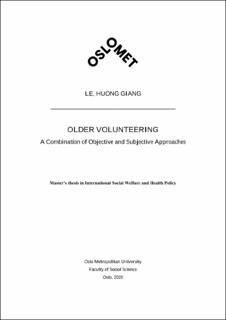| dc.description.abstract | Formal volunteering has become the forefront of discussion on productive aging activity. A growing interest in studying the determinants of volunteering often distinguished between two approaches: (1) objective approaches, examining the association between resources and volunteering, and (2) subjective approaches, investigating the association between psychological factors, such as motivations and volunteering. However, a limited number of studies attempt to examine the association between formal volunteering intensity (inactive and active volunteering) with a combination of subjective and objective factors. The purpose of this Master thesis is to address this limitation by empirically examining the association between resources, motivations, and the intensity of formal volunteering.
This study used a sub-sample of older volunteers derived from the nationally representative data of the Norwegian Life Course, Ageing, and Generation Study (NorLAG) third round (2017). The data included 2,222 volunteers aged 50 and older living in Norway. Guided by a combined conceptual framework of resource perspective by Wilson & Musick (1997) and functional approach by Clary & Snyder (1992, 1999) of volunteering, this study used binominal logistic regression to examine whether resources and motivations are associated with the intensity of volunteering.
This study finds that education, cultural capital, and the motivation for utilizing competencies are significantly positively associated with the intensity of volunteering. Although the results only partially support the resource perspective and functional approach theories, it corroborates an integrated theory of objective and subjective approaches. The findings from this Master thesis extend the current knowledge about older volunteering, especially with a holistic view of objective and subjective approaches (i.e., the resource perspective and the functional approach). Voluntary organizations could consider both resource and motivation factors to strategically guide older volunteer recruitment, placement, and retention activities. On the one hand, voluntary organizations should assign volunteers practical voluntary tasks to motivate them to engage more in voluntary work. On the other hand, the older adults who have less intensity of volunteering should not be ignored in voluntary organizations' recruitment policy. The individual preferences for morality and religion positively relate to the intensity of volunteering. It may suggest that the voluntary program related to the benevolence values, religious congregations, and faith-based can be more attractive to older volunteers. | en_US |
